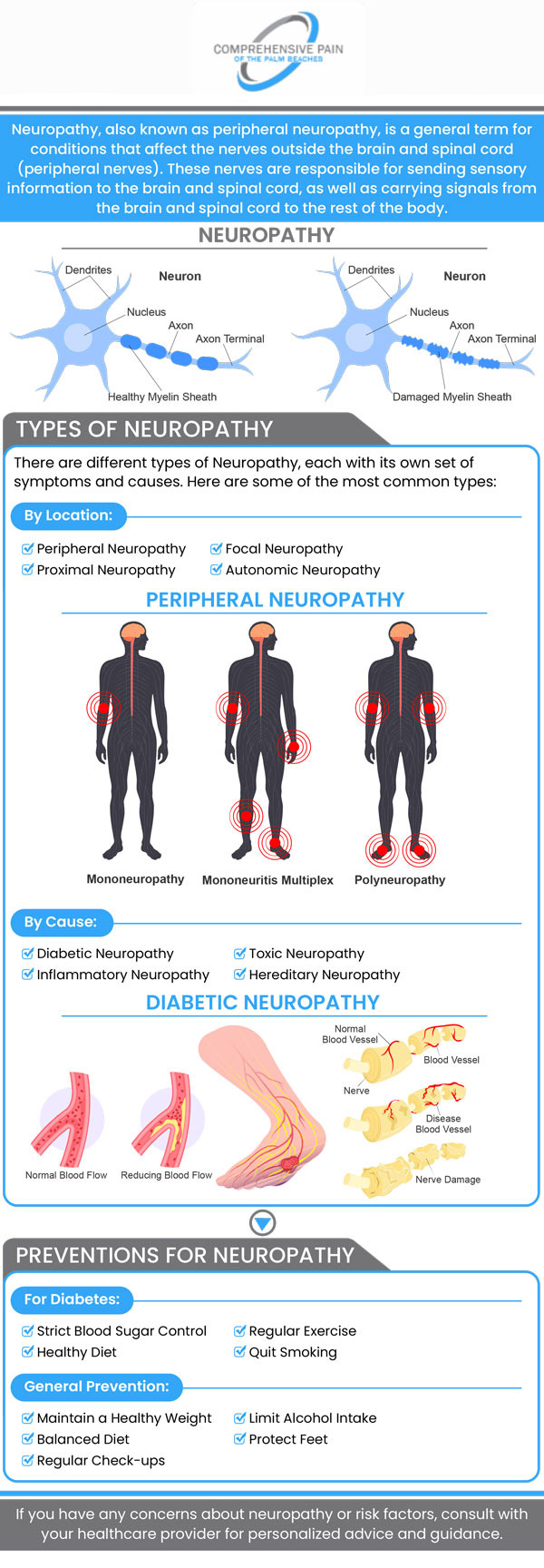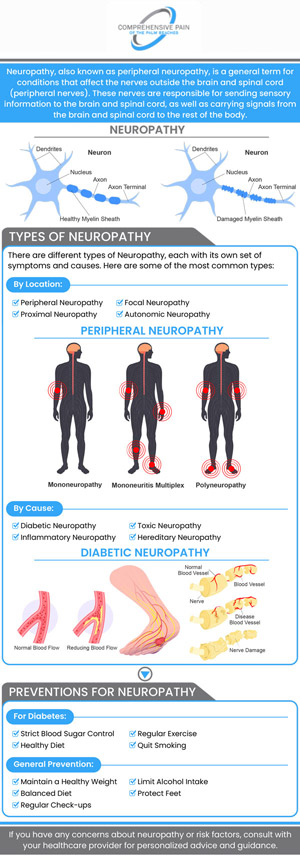Neuropathy Treatment Specialist in Greenacres FL, and Port St. Lucie FL
Neuropathy, addressed by our team at Comprehensive Pain of the Palm Beaches, typically manifests as pain, numbness, and weakness, primarily affecting the hands and feet. Symptoms can also include tingling sensations, muscle weakness, and in severe cases, loss of coordination or burning pain. These symptoms are often chronic and can significantly impact daily activities and overall quality of life. For more information, please contact us or book an appointment online. Our clinics are conveniently located in Greenacres, FL, and Port St. Lucie, FL.


Table of Contents:
What is neuropathy?
What are some of the most common causes of neuropathy?
How is neuropathy diagnosed?
Is neuropathy curable?
Neuropathy is a disorder that stems from damage to the peripheral nervous system, responsible for transmitting signals between the brain, spinal cord, and the rest of the body. When these nerves are damaged, they can disrupt the communication of sensory, motor, and autonomic signals, leading to a variety of frustrating symptoms that can significantly affect day-to-day life.
Common symptoms of neuropathy include numbness, tingling, or a prickling sensation in the hands and feet. This can progress upward into the legs and arms. Some individuals experience sharp, throbbing, burning pain, or heightened sensitivity to touch. In more severe cases, neuropathy can result in muscle weakness, loss of coordination, or even paralysis. Other symptoms may include gastrointestinal issues, irregular heartbeat, or blood pressure problems.
Various factors can lead to neuropathy, including diabetes, autoimmune diseases, infections, exposure to toxins, medications, and vitamin deficiencies. To properly diagnose the cause, healthcare professionals often perform a combination of physical exams, medical history reviews, and tests such as nerve function exams, blood tests, imaging, and occasionally nerve or skin biopsies.
When treating neuropathy, our healthcare professionals focus on addressing the underlying cause of the condition and managing symptoms. A range of options are available, including medications, physical therapy, assistive devices, electrical nerve stimulation (TENS), and sometimes, surgery.
Neuropathy, or nerve damage, can stem from a variety of underlying causes, with diabetes being one of the most prevalent. More than 50% of people with diabetes develop diabetic neuropathy, a type of nerve damage linked to persistent high blood sugar levels over time. This form of neuropathy can damage the nerves in the legs and feet, leading to pain, numbness, or loss of sensation.
Neuropathy can develop as a result of physical trauma, such as injuries from surgeries or accidents. Another common cause of nerve damage is compression from repetitive tasks or extended periods of pressure, like sitting still for long durations. Conditions like carpal tunnel syndrome exemplify how compression can damage nerves over time.
Metabolic disorders, such as kidney or liver disease, contribute to neuropathy by allowing toxins to accumulate in the body, which harms nerve tissues. Autoimmune diseases, including lupus and rheumatoid arthritis, may cause the immune system to mistakenly attack nerves, resulting in nerve damage.
In addition, certain infections like shingles, HIV, and Lyme disease are known to trigger neuropathy. Long-term exposure to toxins whether environmental, chemical, or due to medications can also cause significant nerve damage. Nutritional deficiencies, particularly of vitamins B12, B1, and E, are another risk factor for nerve health, as are hereditary conditions that make some individuals genetically predisposed to neuropathy. Given the broad range of potential causes, early identification and treatment of the underlying condition are key to slowing or preventing further nerve damage.
To diagnose neuropathy, doctors conduct a thorough review of a patient’s symptoms, and medical history, and employ a series of diagnostic and clinical evaluations. Since the symptoms of neuropathy can mimic other conditions, healthcare providers need to take a comprehensive approach to pinpoint the cause.
The diagnostic process typically begins with a detailed medical history review. Factors like a patient’s history of diabetes, exposure to toxins, medication use, trauma, or family history of nerve conditions are carefully considered. A physical exam is then conducted to assess nerve function, motor skills, and reflexes. Signs such as numbness, tingling, muscle weakness, or changes in skin appearance may indicate neuropathy.
To help confirm a neuropathy diagnosis, tests like nerve conduction studies and EMG are used to measure the electrical signals in nerves and muscles. Your healthcare provider may also order blood tests to rule out metabolic or immune system issues, while imaging tests like MRIs or CT scans help identify structural problems that may be compressing nerves. Because neuropathy symptoms can resemble other conditions like peripheral artery disease or carpal tunnel syndrome, a thorough and accurate diagnosis is essential to distinguish between them and guide the right treatment plan.
The question of whether neuropathy is curable largely depends on its cause. In cases where the neuropathy is linked to a treatable condition, such as diabetes or vitamin deficiencies, managing the root cause can significantly reduce symptoms. By addressing these underlying factors, nerve damage can sometimes be slowed, halted, or even reversed.
However, when neuropathy stems from chronic or irreversible conditions such as kidney disease, HIV, or certain types of nerve damage the focus shifts to symptom management and prevention of further nerve deterioration. This might involve medications, physical therapy, or lifestyle changes aimed at improving nerve health. In cases where neuropathy is triggered by specific medications or treatments (like chemotherapy), consulting with a healthcare provider may result in adjustments that can alleviate nerve symptoms.
While neuropathy is not always curable, treatment options can provide relief and improve quality of life. Pain management strategies, physical rehabilitation, and lifestyle coaching can help individuals maintain their mobility and reduce discomfort.
Our team of neuropathy specialists is dedicated to supporting our patients in managing their symptoms, preventing further nerve damage, and improving their quality of life. Visit us for support in understanding your condition and making informed decisions about your treatment options. For more information, please contact us or book an appointment online. Our clinics are conveniently located in Greenacres, FL, and Port St. Lucie, FL. We serve patients from Port St. Lucie FL, Stuart FL, Palm City FL, Greenacres FL, Palm Springs FL, Boynton Beach FL, and surrounding areas.
Check Out Our 5 Star Reviews



Additional Services You May Need
▸ Knee Pain
▸ Arthritis
▸ Back Pain
▸ Neck Pain
▸ Neuropathy
▸ Headaches
▸ Nerve Damage
▸ Fibromyalgia
▸ Chronic Pain
▸ Osteoporosis
▸ Muscle Injuries
▸ Pinched Nerve
▸ Diabetes Pain
▸ Herniated Disc
▸ Pain After Surgery
▸ Mere Conditions


